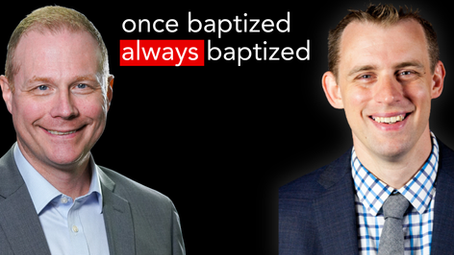top of page
Featured Posts


Why don't we rebaptize?
People frequently wonder whether they should be rebaptized. Usually, it's for one of two reasons. Either they were baptized as an infant, and they ask if they should be baptized as part of their profession of faith. Or they were baptized before they got serious about following Jesus and, having later committed to serious discipleship, wonder if they should rebatized. In this video, I talk through the issues with Dr. Jonathan Powers (Asbury Seminary). We cover: WHY pastors sho
All Posts


Simplify the Message: Multiply the Impact by @TalbotDavis (@AbingdonPress)
Simplify the Message: Multiply the Impact is a brand new book from my friend, Talbot Davis, pastor of Good Shepherd Church in Charlotte,...

Matt O'Reilly
3 min read


Preaching Holiness #UMC
I recently posted a few reflections on John Wesley’s instruction that Methodist preachers ought to preach the doctrine of holiness (or...

Matt O'Reilly
1 min read


Preaching to Inspire Generosity: New Article on #Stewardship @PreachingMag
I’ve got a new article up at Preaching.com. Here’s the intro: No one likes a sermon about money. The people in the pews don’t like them...

Matt O'Reilly
1 min read


3 Reasons for Reading Backwards with Richard Hays (@Baylor_Press)
After attending part of the review panel for Richard Hays’ new short book, Reading Backwards: Figural Christology and the Fourfold Gospel...

Matt O'Reilly
4 min read
New Podcast: Saved All the Way @StMarkMobile #UMC #WesleyanAccent
http://www.podbean.com/media/player/audio/postId/5312367/url/http%253A%252F%252Fstmarkumc.podbean.com%252Fe%252Fsaved-all-the-way-phil-21...

Matt O'Reilly
1 min read


Review: Preaching the New Testament (@ivpacademic)
Two of my top interests are combined in the title of this book. So, I’m very glad to have the opportunity to draw attention to it here,...

Matt O'Reilly
4 min read


5 Ways to Preach the Whole Bible (#andcanitbe)
Leading the church into an ever deeper understanding of the Bible-as-a-whole is no small task, and all who devote their lives to the...

Matt O'Reilly
1 min read


Review: Preach: Theology Meets Practice (Dever & Gilbert)
Books on preaching abound. And those of us who make a regular practice of reading such books must sift through the available volumes to...

Matt O'Reilly
3 min read


Just in case you forgot
“When we hear the ancient bells growling on Sunday morning we ask ourselves: Is it really possible! this, for a Jew, crucified two...

Matt O'Reilly
1 min read


Lincoln on the Sufficiency of the Gospel
“There is a host of different ways in which contemporary believers can be tempted to feel that the basic gospel message is inadequate and...

Matt O'Reilly
1 min read


Panel Review: Saying it Well by Charles Swindoll
#BookReviews #Preaching

Matt O'Reilly
1 min read


The Homiletic Task
The task of the preacher is to proclaim the glory of the triune God, revealed in the cross of Christ and experienced in the communion of...

Matt O'Reilly
1 min read


Evangelizing the Church
The new issue of Preaching is out and contains my article “Evangelizing the Church”. Here’s the intro: If you are like me, there may have...

Matt O'Reilly
2 min read
The Scandal of Preaching in a Digital Age
The new issue of The Princeton Theological Review is now available online and contains my article, “Faith Comes from Hearing: The Scandal...

Matt O'Reilly
1 min read
What is the Role of the Pastor?
What is the role of the pastor? This topic has garnered quite a bit of attention around the blogosphere as of late. I first came across...

Matt O'Reilly
2 min read
Why Do I Preach through Whole Books of Scripture?
The quickest answer is simply: because that’s how I have received them. The triune God has sovereignly chosen to preserve the scriptures...

Matt O'Reilly
2 min read
Theological Education in a Pluralistic World
The record of Paul’s visit to Athens in Acts 17 provides an informative glimpse into the religious culture of the first century...

Matt O'Reilly
3 min read


Calvin on Preaching
Here’s a quote on Calvin and preaching from Gerald McDermott’s The Great Theologians: a Brief Introduction (IVP, 2010): “Despite his...

Matt O'Reilly
1 min read


PTR Review of Why Johnny Can’t Preach
The Fall 2009 issue of the Princeton Theological Review is online and contains my review of T. David Gordon’s Why Johnny Can’t Preach:...

Matt O'Reilly
1 min read


New Preaching Article: 5 Things to Know About Preaching Whole Books
The new issue of Preaching (25.6) is now online and contains my article: “Five Things You Need to Know About Preaching Through the Books...

Matt O'Reilly
1 min read
bottom of page









